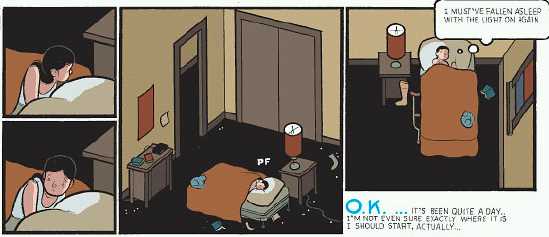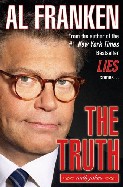John Updike takes on the new Gabriel García Márquez novel. He decries the book’s narrator for not considering “the atavistic barbarism of buying girls in order to crack their hymens.” But more interestingly, he offers one of the oddest sentences ever seen in the New Yorker‘s history: “The narrator’s asshole, we are told more than once, burns.”
Month / October 2005
Sufjan Stevens: The Kieslowski of Indie Pop?
Bookish reports that singer-songwriter Sufjan Stevens is now writing 50 songs for 50 states.
Men Who Read Magazines: Easily Bored or More Complicated?
BusinessWeek reports that men aren’t reading magazines the way they used to. I’m going to suggest something radical: Could it be that men are more complicated than the current lad magazine world gives them credit for?
Of course, with this decline comes one thankful development: “Maxim and the laddie titles it spawned are hardly in danger of disappearing, but their newsstand sales are far off their previous peaks. Meanwhile, ad categories that gravitate toward men’s titles, such as domestic automotive and technology, are down this year.”
Shorter and Shorter
During a particularly harsh bout of insomnia that involved carrying on a colloquy with my skull, I buzzed down my hair to the shortest length that it has ever been. Now it was pretty short to begin with, but this time, I used a #1, dammit. I shaved the pesky fuzz down mercilessly. Not Max Barry length, but pretty damn short. My hair is tantamount to a Chia Pet in the early stages of growth. The early reports are in:
OPINION: “You look more like a dude.”
ANALYSIS: Was I not masculine enough before? Or do some women require a je ne sais quoi Mr. Clean makeover in order to remain convinced that said dude does indeed possess a Y chromosome and maintain an unabated ardor for mammaries?
OPINION: “Did you get a haircut?”
ANALYSIS: No, I didn’t actually. I woke up and my hair grew magically shorter. Glad you noticed.
OPINION: “Wow, you’re going bald.”
ANALYSIS: Thank you. I wasn’t aware of this.
I am very close to doing without hair altogether.
Chick Lit, Feminism and the Double Standard
Funny how when it comes to a form like comics being bastardized, Jessa Crispin has no problem broadsiding the critics for declaring a specific genre less than literary. But that apparently isn’t the case when it comes to chick lit. Without citing a single example, Crispin suggests that “chick lit treats women like they’re stupid.” Well, that’s interesting. Because while reading Weiner’s latest, Goodnight Nobody, I didn’t really get the sense that the female characters within its pages were stupid. And while I never really cared for the Bridget Jones books (although I have enjoyed the three Weiner novels that I’ve read), I never got the sense that these novels were contributing to idiotic depictions of women. Unless Crispin somehow believes that any book featuring a professional woman who pursues a relationship or contends with family or pregnancy is dumb (which, interestingly enough, would discount nearly all of the books she links to). Even when certain “chick lit” novels disagreed with me, I nevertheless applauded these books for placing women’s issues to the forefront and having the courage to place these plots within popular literature.
One might dislike the genre of popular literature, but from a feminist perspective, it’s a mistake to dismiss the potential effects of popular art towards pointing out the silent rules and folkways which insist women must act in a certain way.
I think what Weiner is commenting upon in this interview is the double standard. Sure, a popular author like Stephen King can be published in the New Yorker and get mad props from literary maestros. But if a woman is a popular author (like Jennifer Weiner), she’s given the snobbish Sittenfeld-style treatment by her peers. Why is there such a double standard?
In fact, I applaud Weiner for featuring one of the most realistic (and hilarious) sex scenes I’ve read in a novel this year, complete with a woman flustered by her husband’s tired advances and the husband clueless enough to wear nothing but black socks to bed (and let’s face it, men, we’re all guilty of this, even when we’re told not to). I certainly haven’t seen sexual failure presented in such candid terms within a single literary novel I’ve read this year.
Scariest. Halloween. Ever.
Trailer for Halloween: Washington — (MP3) (57 seconds)
Chris Ware: the Next Jim Davis?

I think it’s time for the Yankee Potroast guys to start summarizing Chris Ware’s The Strip: Building Stories. Because much as I love Jimmy Corrigan, this ain’t going nowhere and this sure ain’t funny.
Lovebirds in Prison
If, like me, you’re looking for that special someone, it’s always good to keep your options open. But if you’re the type to play with fire in this department, thankfully, the shady folks over at Meet an Inmate have set up what may very well be the 21st century’s answer to the mail order bride (particularly given increasing incarnation rates). If you are a red-blooded male, for only $3 each, you can obtain the contact information for a prison inmate of your choice. (Male addresses are free. So you’re in luck, ladies!) Match.com, schamtch.com! The site has categorized the inmates by age — all of them featuring a picture. For each entry, you’ll find out the release date and what “activities in prison” each inmate is involved in. But, strangely enough, you won’t get the answer on what the inmate’s doing time for. (Well, I suppose you need to maintain enigma somewhere.)
If you’re willing to accept a potential lover’s “ruthless past”, into girl next door types who aren’t into shortcuts or you’re a 50-60 year old man into Geminis who work out, then the sky’s the limit!
Sure, your potential sweetheart might have stabbed someone in the back (literally!) or might be able to give some video game junkie-cum-romantic the real definition of “grand theft auto.” But if Hollywood treacle is any reliable indicator of life, then I think we can all agree that “love conquers all.”
In Which Jennifer Weiner Is Assaulted by the Marina People
Jennifer Weiner is back home and she notes this strange question about a woman asking her at the San Francisco Barnes & Noble if she was “self-actualized.” This is not much of a surprise, as this Barnes & Noble is very close to the Marina. Such strange terminology is bandied about by residents there on a daily basis. Although for those of us in the Haight and the Mission, we would never think of asking any distinguished lady if she was “self-actualized,” as most living bipedal mammals, are by their very nature already quite actualized by way of living, breathing, thinking and feeling. On behalf of my fellow San Franciscans, I apologize to Ms. Weiner for being frightened by the Marina people and hope that the publicists book her in safer quarters for the next book.
“Mr. Franken, I Served With Jonathan Franzen. I Knew Jonathan Franzen. Jonathan Franzen Was a Friend of Mine. Mr. Franken, You’re No Jonathan Franzen. And Nix the Tie While You’re At It, Sir!”


Colors of the Rainbow
William T. Vollmann’s The Rainbow Stories, the illustrated version. (An incredible find from the Rake.)
Excerpt from Lewis Libby’s Next Novel
CBS News: From 1982 until 1985, he served as director of special projects in the Bureau of East Asian and Pacific Affairs. It was perhaps this post that inspired him to write “The Apprentice,” his 1996 thriller that takes place in 1903 Japan.
BREAKING NEWS ITEM: Libby, inspired by the turn of events while serving as Dick Cheney’s Chief of Staff, has decided to return to novel-writing. Return of the Reluctant has obtained an early excerpt of Mr. Libby’s next novel, tentatively titled The Yesman.
Synopsis: It is the winter of 2005 and an anal retentive yesman, not above lying and obstructing justice, finds himself plunged headlong into the world of unemployment and possible prison time in this gritty new thriller from Lewis Libby.
EXCERPT:
I stood in the dole line, lusting after my ex-boss’s cherubic head. It was all I had left. The vicious scowls he gave reporters had always excited me. But I knew that my ex-boss had a lot more going on than a bum ticker. That’s why I took the bullet. That’s why I was breathing in asbestos from the cracked tiles below. It was the kind of devotion that most people don’t understand. Because corruption’s a bit like an afternoon cookie: warm, comforting yet somehow sinful if you have more than one. Me? I wanted the whole jar. Can you crucify a man for having a large appetite?
The least my boss could have done is let me kiss him: the way that LBJ was always fond of kissing Sam Rayburn’s head. And now I was here, waiting for a measly unemployment check, surrounded by smelly people who were scaring the hell out of me. My ex-boss wouldn’t write me a letter of recommendation. But then he had always rebuffed my advances. That’s why I crossed the line in the end. Now I was standing in one.
This was one of many reasons why I had started using crutches. Perhaps people would feel sorry for me. I was a victim, after all. Perhaps they’d understand that, despite my despicability, I was a wounded man. In need of a cookie. Or maybe a hug.
You work in this town long enough and you find that everyone needs a cookie in the end. And not just a harmless oatmeal one, but maybe a chocolate fudge-striped cookie loaded with additives that isn’t all that good for you.
Well, as my ex-boss always told me, sometimes you have to live a little. Sometimes you have to cross the line.
Sometimes you have to eat a lot of cookies.
Lost & The Third Policeman
The Book Standard asks if a reference to Flann O’Brien’s great classic The Third Policeman on the television show Lost has had any sales impact. Aside from confusing O’Brien’s book with an O’Brien title I wasn’t aware of (The Last Policeman? Man, I wish that wasn’t a typo.), it’s revealed that Dalkey Archive ordered an extra print run of 10,000. Lost writer Craig Wright has also gone on record, suggesting that the O’Brien book would be “invaluable to fans seeking to unravel the island’s mystery.” I find this claim skeptical, given writer David Fury‘s remarks in Rolling Stone a few weeks ago, where he suggested that the show’s producers were making the story up as they went along, concluding, “It’s a brilliant trick to make us look smart.”
Subterfuge or no, at the time of composing this post, The Third Policeman has an Amazon rank of #1,518. And the Book Standard reports that Dalkey has shipped 15,000 more copies to meet increasing demand. That’s pretty remarkable for a casual reference in a hit television show. Of course, one wonders if these sales would have happened had Craig Wright not insinuated a tie-in. But if it gets people reading Flann O’Brien, perhaps they’ll devote their energies to discussing bicycle metaphors rather than deconstructing a highly addictive show that might be less profound and symbolic than we’ve been lead to believe.
“Don’t Call Me Tiny” Takes On a Whole New Meaning
The Bat Segundo Show #11
[PRODUCER’S NOTE: Jorge was unavailable this week. So we were forced to enlist a man who claimed to have performed voiceover work for the 1970s incarnation of Battlestar Galactica to precede Mr. Segundo. Efforts are being made to coax Jorge back to the program, but it’s a little complicated. Mr. Segundo explains the problem in full.]
Authors: Laila Lalami, Scott Esposito, Beth Wadell and Tito Perez.
Condition of Mr. Segundo: Not the brightest pervert in the daisy chain, but surprisingly alcohol-free in light of the Jorge contretemps.
Subjects Discussed: Laila’s poverty fiction essay, her book list for Large Hearted Boy, chance vs. choice, John Steinbeck, reference points for North American audiences, writing in English, fiction which operates beyond culture, When Men Cry, the immigration situation in Morocco, Dirty Pretty Things, how to make cultural fiction to the publishing industry salable, subcultures neglected by the publishing industry, sympathizing with characters, cultural perceptions, how men hug, narrative perspective, taboos, a mysterious friend, Ishiguro’s Never Let Me Go, sasquatch, litblogging, unexpectedly meeting people, the current state of book review coverage, how much people read, the LBC, William T. Vollmann, being inundated by galleys, guilt, “unfair advantages,” the influence of Moorish Girl upon awareness of Hope, the origins of Laila’s blog, politics, the influence of litblogs, literature as one big party, a brash and quite silly claim involving a superhero, restoring literature’s place in American culture, Pablo Neruda, city-based book programs, the Oprah Book Club, advertising, Gus Lee, a brief but more sustained Q&A about sasquatch, what Laila’s working on now, and what it’s like to be an author on tour.
The Coolest Brush in the World
At Theatres: Atwood
Margaret Atwood has made her acting debut. Sort of. The deal is that there’s a staged reading in the works of The Penelopiad, Atwood’s latest novel. The book is a reinterpretation of the Odyssey told, go figure, from Penelope’s perspective. Atwood will be playing the part of Penelope. But what’s particularly interesting is how Atwood justified the way women helped Odysseus: ” It’s surprising how many women there are in the Odyssey and they all help Odysseus, which is why I made him so charming. He’s the kind of guy women like – he has a lovely voice, he takes an interest in them, he understands human nature. That’s why he’s so persuasive: he doesn’t get his way by force, he’s not a thug. He was fun to be around. That’s why Penelope is sad he’s not there. He’s helped by women at every turn: by Helen in The Iliad, and by all the goddesses he meets along the way in the Odyssey. And then there’s Penelope holding the fort while he’s away. That’s the kind of guy he was.”
Wickett Rejuvenated
The erstwhile Mr. Wickett has returned from vacation and, once again, he’s demonstrated to the world that he has the stamina of ten men. (Might he be a literary Hercules? Well, who is to say? All we know is that the world is a better a place with Dan Wickett.) Wickett has served up another panel of literary journal editors, featuring the heads of the New Orleans Review, the Colorado Review, A Flasher’s Dozen, The Laurel Review, Thieves Jargon, and The Harvard Review.
On the Job, Going Postal’s a Close Second to Blogging
Forbes Magazine has peered into the workplace and determined that it’s the bloggers who are evil incarnate. Good to see time and money spent on exposing the real threats to society (and, of course, business).
Conversation from Deep Within the Pentagon — Last Night
HANK: All these millions of dollars they’re giving us.
HAL: Billions, Hank. Billions.
HANK: Alright, billions.
HAL: I understand, Hank. It’s hard to maintain a little humility around here. But don’t forget. We’re living in a golden age. I hope you’re taking advantage of the masseuse.
HANK: Well, you take any chance you get. Hey, speaking of which, you want to see the new toy that just came in?
HAL: You mean, that $3 million weapon that will allow us to kill those Iraqis ten times faster?
HANK: Even better. Stuff for the Homeland. Special ordered, since they’re not buying our orange alerts anymore. This little baby will throw funny lights into the air. In fact, let’s fuck with California right now.
HAL: New Age exercise freaks. Fifth largest economy.
HANK: I know, but here’s the thing. Many of these Californians, particularly those in the southern region, are stupid enough to believe in lights. Watch this. I guarantee we’ll get a small cult and a Chronicle article out of it. You know Mt. Davidson?
HAL: That mountain with the big cross. From Dirty Harry?
HANK: Yeah, that’s the one. Well, since those San Franciscans have stopped believing in God, let’s put the General’s lessons to the test.
HAL: You got video on this?
HANK: Yup. See that kid with the frightened expression on his face? Well, he’s got a camera and he’ll be sending this into the newspapers. Maybe the kid’s an agnostic. But he’ll be believing something in the morning.
HAL: Is this ethical?
HANK: Who cares about ethics? We’re at war here.
HAL: Tell a lie often enough, flash a light frequent enough, and they’ll believe anything.
HANK: Hell, they can believe anything they want to. Just so long as they’re shitting their pants on a regular basis. Anything to keep our citizens under control. We need these safeguards right now because they’re starting to doubt Our Leader. So why not host a banquet of fear?
HAL: Serves 300 million, eh, Hank?
HANK: Intelligent Design. Accept no substitute.
HAL: You know what the best part about this is, Hank?
HANK: What?
HAL: We don’t have to confirm anything.
Powell’s — Another Outlet Promoting Online Classism?
What M.A.O. said. Dave Weich can keep living in a glass tower as long he wants. But to take on the attitude that one must have a credit card in order to survive, let alone purchase books, is to subscribe to the same atavistic and paralogic thinking as doze poor peeples kints read and dere checks will bounce bekaz dey poor. Shame on Weich and shame on Powell’s for refusing to accommodate a form of payment that has been around much longer than the credit card.
[UPDATE: Dave Weich responds to Orother over at Maud’s.]
Chronicle of Outsiders
The Golden Boys of Literature
The inestimable Tito Perez sends along this Sam Sacks item concerning Dave Eggers’ Best American Nonrequired Reading Series, largely because of the Vollmann shoutout. Sacks decries the “wriggling spinelessness of [Eggers’] reviewers” just before going nuclear on the Eggman. The review is interesting for a few reasons: (1) I had thought that the New York Press was catering to centrist suburbanites under the new regime. Apparently, this isn’t the case with the literary section. (Will we see more Mark Ames-style takedowns?) (2) Sacks is quite right to point out that Eggers’ position as promoter and writer has gone largely uncriticized. I’m not sure if declaring Eggers “the Don King of literature” is the most effective way to draw a complete portrait. But if the New York snarkmeisters are going to hire doofuses like Steve Almond to savage indie media, they may as well be consistent in their targets. Certainly, they don’t pull punches like this on Fleet Street.
Anthony Burgess: Liar But Fantastic Journalist
The Telegraph has a review of Anthony Biswell’s long-awaited biography of Anthony Burgess (now available from Picador). But it looks as if the Telegraph has their crosshairs locked on Burgess’ twelve year old corpse when comparing Biswell’s previous biography (The Real Life of Anthony Burgess) with Roger Lewis’ 2002 biography. Among the charges: Burgess was a liar, “provisional and opportunistic,” a “highly developed” potency complex, Burgess’ second son not of Anthony’s loin, and the charge that Burgess thought he was Don Quixote. But if it’s the words that count, then Burgess is paid the highest compliment: “He was a terrific journalist. Couldn’t write a dreary column to save his life.”
(For another perspective on the Biswell bio, the Anthony Burgess site has sunk teeth into the bio, which notes that Burgess somehow found the time to write eight hours a day (all seven days) without a break and, by Burgess’ admission (true or false?), he was often in the pub by lunchtime.)
In Lieu of Meaning
- Litkicks offers a contrarian take to the Lethem-Birnbaum colloquy.
- Legion (via Brandywine Books).
- Hemingway and Dos Passos, war buddies. (via Rake)
- At Galleycat, various folks comment on this Elizabeth Royte article. (Hint on our take: If we weren’t on brownie hiatus, Tanenhaus wouldn’t be getting any.)
- A presentation of The Canterbury Tales.
- Open Brackets on giving translation services away.
- Scribbling Woman on business speak pervading academia, which isn’t exactly something academics aren’t loath to negotiate themselves.
- More on the Google Library dispute from Scrivener’s Error.
- The MacAdam/Cage site has relaunched.
Outrageous Fortunes
First Warren Buffett, now Terry McAuliffe. Sweet Jeebus. What provokes these nutball seven-figure advances? Sure, Buffett and McAulife have both proved quite adept in the cash-raising department. But why do publishers think that these money skillz somehow translate into a book that will move copies just as well? Unless, of course, Buffett and McAuliffe know something about book proposals that we don’t.
Small Wonder
The Wonder Chicken returns, although he’s playing hard to get and feeling a bit introspective about this aging thing: a existential predicament that we can certainly relate to.
The Dartboard, Alas, Is Not Represented
Idea Generation Methods (via MeFi)
Target: Refusal Clause Happy
It looks like Target policy involves refusing to fill emergency contraception prescriptions. In a Missouri Target store, a 26 year old woman was refused an emergency contraception prescription. When she asked why, she was told by the pharmacist, “I won’t fill it and I don’t have to fill it and that’s my right!”
Why should something as ridiculous sounding as “Target Greatland” have control over a woman’s body?
I’m not really surprised, given that when you walk into a Target store, you are a “guest” not a “customer.” This is fantastic linguistic chicanery, because while one can legitimately claim “the customer is always right,” anyone who has unknowingly served Drink Number 7 to a party guest would be hard-pressed to suggest that “the guest is always right.”
Planned Parenthood has sent three letters to Target. There have been an additional 4,600 letters from people around the country. Target refused to respond to them.
Target has however answered the City Pages. And Target claims, without producing their findings, that the “alleged incident” was a he-said, she-said thing and, through perhaps unintentional subtext, they have essentially endorsed the refusal clause.
There are two solutions here: (1) boycott Target or pressure them to adopt a wholesale ban on refusal clauses and (2) engage in a national campaign to get state legislation (in as many states as possible) passed that prohibits any pharmacy from employing the refusal clause (specifically in relation to a woman’s right to buy an emergency prescription).
Is the AAP’s Google Lawsuit Truly Reflective of Its Members?
Richard Nash has returned from Frankfurt and he’s now blogging up a storm. Perhaps his most interesting entry is this exchange between Nash and the Association of American Publishers over the Google Library Project lawsuit. (Background reading on the subject can be found here.) What’s particularly interesting is that the AAP’s litigious ardor stems from its representative government. Further, other AAP members (say, smaller presses) don’t seem to factor into the Board’s decision. The unnamed representative at the AAP writes:
As you know, AAP has a Board of Directors that is elected by our members and empowered by AAP’s bylaws to make decisions and take actions on behalf of the entire AAP membership. Quite often, issues that eventually come before the Board for decisions and actions are initially explored and considered by one or more of AAP’s committees and divisions. AAP staff routinely work to facilitate participation in these committees and divisions by all interested members, and members are always encouraged to contact AAP staff to make known their interests, concerns and views on relevant matters.
I tried hunting around the AAP site to see if I could locate a copy of these bylaws. Given that the publishing industry is a mighty and multifarious zoo populated by animals of different stripes, I figured (perhaps naively) that any large organization might have some exigencies for allowing minority opinions (such as Nash’s) to be voiced and considered, if not outright memorialized before the Board. Alas, no such luck.
However, I did locate this list of the Board of Directors. And I’m not certain if the Board’s current makeup genuinely reflects the industry as a whole. Sure, we have the big behemoths (with Houghton Mifflin as chair, Random House as vice chair) well represented. But aside from a few midsize educational publishers, why isn’t a single member of the board a small or midsize fiction publisher? Surely, any board hoping to represent the entire publishing industry would fill at least one slot along these lines. Then again, “small publisher” probably means something fundamentally different to me than it does to Pat Schroeder.
Further, the AAP’s lawsuit seems to work against their stated agenda. Among the AAP’s goals: “To expand the market for American books and other published books in all media” (emphasis mine) and “To aid AAP member publishers in exploring the challenges and opportunities of the emerging technologies.”
So we’re left with the AAP’s letter to Nash, which is, as Nash notes, “civil” but ultimately a bit dismissive towards anyone who disagrees with the unquestionable wisdom of the mighty Board (“We would certainly welcome the opportunity to answer any questions you may have regarding the basis for AAP’s actions, and perhaps to even persuade you to reconsider your disagreement with those actions.”).
In other words, the sense I’m getting here is that, if you happen to be an AAP member and you have a different spin on an issue that the representative board is considering, not only are your thoughts disregarded when the Board decides upon a course of action that has a tremendous effect on the whole (and, in this case, the lasting power of backlist titles), but the Board doesn’t offer a viable alternative that might help the member explore the “opportunities of the emerging technologies.”
So I have to ask: Is the AAP really there for its Google Library-friendly members? Or does this lawsuit exist to appease the big boys rather than considering this issue holistically?

